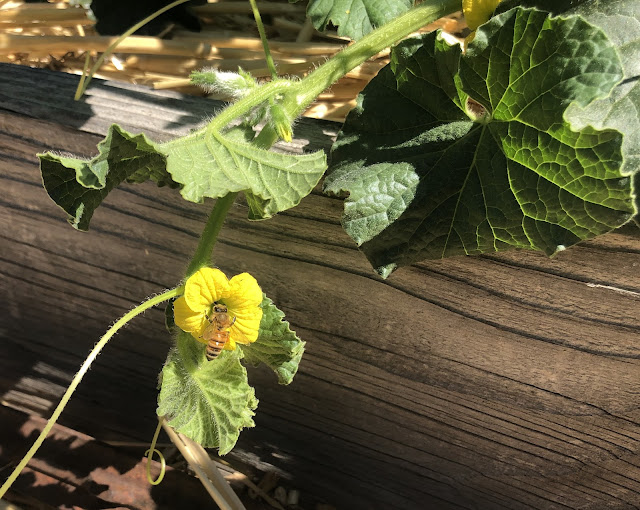
Heat is here; help your garden cope with so much sun

|
| Bees are important pollinators of melons, above, and squash, but they are likely to be less active in hot weather, so give your plants a hand with pollination. (Photo: Kathy Morrison) |
Hot: That’s the official Sacramento forecast for this week. What would you expect?
As the National Weather Service’s Sacramento office tweeted Saturday: “How confident are we that this weekend will be hot? It’s a sure bet it will feel like July.”
Triple-digit highs continue at least Sunday and maybe Monday before a slight cooldown to the mid 90s – normal for mid-July in Sacramento. According to the weather service, overnight lows will dip down to around 60 each night; that will help temper those sizzling afternoons.
Few if any clouds are in the forecast, so expect lots of blasting sun. Consider erecting some temporary shade for peppers, eggplant, tomatoes and other plants prone to sunburn. They’ll appreciate it.
Watch out for your own health, too. Limit outdoor activity to early morning or early evening. Wear sun protection. Don't overdo it; heat stress is dangerous.
* Water early in the morning, preferably before 8 a.m. That will cut down on evaporation.
* One good thing about hot days: Most lawns stop growing when temperatures top 95 degrees. Keep mower blades set on high. Longer grass needs less irrigation; it shades its own roots.
* Keep your vegetable garden watered, mulched and weeded.
* Don’t let tomatoes wilt or dry out completely. Give tomatoes a deep watering two to three times a week. (Note: Tomatoes and other broad-leafed vegetables sometimes wilt in the afternoon as a survival technique. They should pop back into form after sundown. Wilting in the morning in when you should worry about them -- and water them.)
* When temperatures cool down later this week, fertilize vegetables and blooming annuals, perennials and shrubs to give them a boost. Feeding flowering plants every other week will extend their bloom. Always water before applying fertilizer.
* Harvest vegetables promptly to encourage plants to produce more. Squash especially tends to grow rapidly in hot weather. Keep an eye on zucchini.
* If your melons and squash aren't setting fruit, give the bees a hand. With a small, soft paintbrush, gather some pollen from male flowers, then brush it inside the female flowers, which have a tiny swelling at the base of their petals. (That’s the embryo melon or squash.) Within days, that little swelling should start growing.
* Remove spent flowers from roses, daylilies and other bloomers as they finish flowering.
* Pinch blooms from basil so the plant will grow more leaves.
Comments
0 comments have been posted.Sacramento Digs Gardening to your inbox.
Sites We Like
Garden Checklist for week of July 21
Your garden needs you!
* Keep your vegetable garden watered, mulched and weeded. Water before 8 a.m. to reduce the chance of fungal infection and to conserve moisture.
* Feed vegetable plants bone meal, rock phosphate or other fertilizers high in phosphate to stimulate more blooms and fruiting. (But wait until daily high temperatures drop out of the 100s.)
* Don’t let tomatoes wilt or dry out completely. Give tomatoes a deep watering two to three times a week.
* Harvest vegetables promptly to encourage plants to produce more. Squash especially tends to grow rapidly in hot weather. Keep an eye on zucchini.
* Pinch back chrysanthemums for bushy plants and more flowers in September.
* Remove spent flowers from roses, daylilies and other bloomers as they finish flowering.
* Pinch off blooms from basil so the plant will grow more leaves.
* Cut back lavender after flowering to promote a second bloom.
* It's not too late to add a splash of color. Plant petunias, snapdragons, zinnias and marigolds.
* From seed, plant corn, pumpkins, radishes, winter squash and sunflowers.